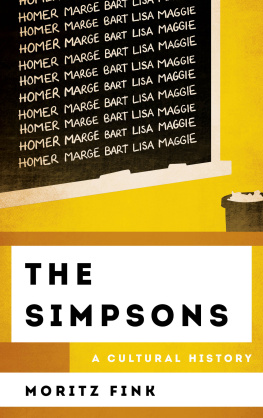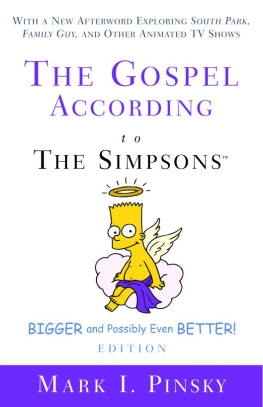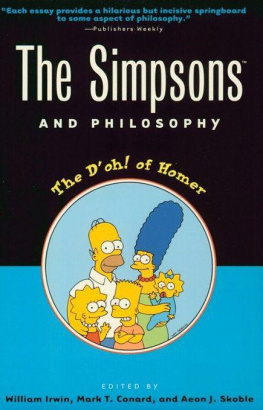HOMER ECONOMICUS
The Simpsons and Economics
Edited by
JOSHUA HALL
STANFORD ECONOMICS AND FINANCE
An imprint of Stanford University Press
Stanford, California
Stanford University Press
Stanford, California
2014 by the Board of Trustees of the Leland Stanford Junior University.
All rights reserved.
No part of this book may be reproduced or transmitted in any form or by any means, electronic or mechanical, including photocopying and recording, or in any information storage or retrieval system without the prior written permission of Stanford University Press.
Special discounts for bulk quantities of titles in the Stanford Economics and Finance imprint are available to corporations, professional associations, and other organizations. For details and discount information, contact the special sales department of Stanford University Press.
Tel: (650) 736-1782, Fax: (650) 736-1784
Printed in the United States of America on acid-free, archival-quality paper
The Simpsons (episode: Trilogy of Error) written by Matt Selman. and 2001 Twentieth Century Fox Film Corporation. All rights reserved.
The Simpsons (episode: Much Apu About Nothing) written by David S. Cohen. and 1996 Twentieth Century Fox Film Corporation. All rights reserved.
The Simpsons (episode: Homers Triple Bypass) written by Gary Apple and Michael Carrington. and 1992 Twentieth Century Fox Film Corporation. All rights reserved.
The Simpsons (episode: $pringfield) written by Bill Oakley and Josh Weinstein. and 1993 Twentieth Century Fox Film Corporation. All rights reserved.
Library of Congress Cataloging-in-Publication Data
Homer economicus : The Simpsons and economics / edited by Joshua C. Hall.
pages cm
Includes bibliographical references and index.
ISBN 978-0-8047-9097-0 (cloth : alk. paper)
ISBN 978-0-8047-9171-7 (pbk. : alk. paper)
1. Microeconomics. 2. Economics. 3. Simpsons (Television program) I. Hall, Joshua C., editor of compilation.
HB172.H66 2014
330dc23
2013047797
ISBN 978-0-8047-9182-3 (electronic)
Typeset by Bruce Lundquist in 10/14 Minion
CONTENTS
Joshua Hall
Anthony M. Carilli
Douglas Rogers and Peter J. Boettke
Art Carden
Andrew T. Young
Gregory M. Randolph
Per L. Bylund, Christopher M. Holbrook, and Peter G. Klein
Diana W. Thomas
Justin M. Ross
John Considine
Seth R. Gitter and Robert J. Gitter
David T. Mitchell
Lauren Heller
Mark Thornton
Douglas M. Walker and Shannon M. Kelly
Jodi Beggs
Steven Horwitz and Stewart Dompe
PREFACE
Joshua Hall
I was living in a suburb of Columbus, Ohio, when I got my first taste of teaching economics. I was asked at the last second to fill in on a principles of economics section at a small university near my home called Capital University. Though I had been a teaching assistant for many classes while earning a masters degree in economics, I had never had complete control over the classroom. It seemed to me that there were two main questions I needed to answer: What did I want my students to learn? and Did I want to be a guide on the side or a sage on the stage?
Answering the first question was easy (and not just because I knew the name of the course!). Since my graduate school days, I had been concerned that we were going about teaching principles all wrong. Most people who take an economics course are never going to take another one in their lives. Knowing that, principles courses should not be focused on preparing students for advanced study of economics but instead giving them tools and insight that will help them at work, at home, and at the ballot box. My job as a teacher was to show them how economics explained the world around them, not just some lines on a chalkboard. The bigger question was how to do it.
While the first couple of days convinced me that I preferred to lecture, I also realized that a two-hour lecture was just too long if you didnt break it up every thirty minutes or so. How could I break things up and show students that economics was everywhere? At first I would just stop the lecture and illustrate a topic with an example from that days newspaper or by discussing how a scene from a classic movie or television show illustrated a concept. I soon realized that most of my examples were coming from The Simpsons, and as luck would have it, the first couple of seasons of that program were just starting to come out on DVD. So I began to show brief snippets of episodes in class when appropriate. I quickly found that students loved to talk about The Simpsons and to learn by using examples from the show. Students began to come up to me and say things like, Did you see in last nights episode Homers fear about donating a kidney to his dad illustrated the trade-offs organ donors face? In my mind, that was a clear sign that using The Simpsons was getting them to engage with the course material.
Nearly a decade later, I have taught thousands of students using The Simpsons, authored one article McCloskeys response was roughly, A title like that deserves a book.
So while I did originally ignore McCloskeys advice, after running into dozens of economists over the years that were using The Simpsons in the classroom, I realized that she was right. A title like that did deserve a book, and the only question was how to get it done. After all, I could write it, but what fun would that be? Instead, I contacted dozens of excellent economics teachers and scholars who were also Simpsons fans and asked them if they would be willing to contribute to a volume explaining how the show illustrates homer economicus in action. The response was tremendous, as my inbox was flooded by essays using The Simpsons to illustrate concepts in economics from general ones such as money or unintended consequences to very specific areas of inquiry such as health economics or the economics of prohibition. Luckily for me everyone clearly understood that the book is about how The Simpsons reflects concepts or ideas from economics, not about how much money Matt Groening has made from the show!
The book is organized into three sections. Because The Simpsons is primarily about the Simpsons family and the other residents of Springfield, the book focuses primarily on microeconomics. Microeconomics is the study of human behavior in small units, such as individuals, families, or firms. The first three , and they deal with the economic way of thinking and primarily focus on understanding individual behavior and decision making. I tell my students that studying economics is like putting on a pair of glasses that let you see the world in a different way. The basic economic lessons about individual behavior, the market process, and tracing out the effects of policies are all laid out in these three chapters.
discuss situations when free markets might not lead to desirable outcomes, such as monopolies and externalities (think Springfield Nuclear Power Plant). The economic analysis of politics concludes this section, as John Considine explains how a television clown such as Sideshow Bob can become mayor. (Really, is it so different than Al Franken becoming senator?)
The third and final section of the book discusses topics in applied microeconomics. Basically, these are the tools of economics that were discussed in the first two parts applied to particular policy areas and topics. So we have explanations of the economics of immigration (, and the book concludes with a thought-provoking chapter by Steven Horwitz and Stewart Dompe on how changes in the lifestyle of the Simpsons illustrate how the economic progress that has occurred over the past two decades is contrary to some economic statistics.
Next page









